We recently received the following voice mail on a personal cell phone:
“Hi this is Emma XXXX and I’m following up regarding your eligibility for forgiveness and it looks like your application is incomplete and needs to be submitted before the end of the deadline. It is urgent that you return the call to complete your application and to avoid payment or punishment. If you could please call our dedicated eligibility counseling at 1-800-XXX-XXXX to complete your application and finalize your involvement at soon as possible. Again the number is 1-800-XXX-XXXX, thank you and I hope you have a nice day.”
This call has all of the telltale signs of fraud: it was unsolicited, I did not provide my personal cell when National Council applied for their PPP Loan and the caller does not provide the name of the organization.
We all know we should never provide social security numbers, banking/credit card information, or upfront payments, but fraudsters can be tricky and work to make you comfortable enough to provide this information or find a way into your computer and infect it with malware.
Fraudulent calls and emails may appear legitimate at first glance. Emails often use the correct logos for an organization and even direct you to an official-looking website. Be skeptical before you respond or click on a link in an email. Are you expecting the call or email? If the information is pertinent to your current work, move your mouse pointer over the email to reveal the actual full address of the sender and determine if it looks correct. An email regarding a business or government program does not normally come from a personal account or a foreign country. Also, look for misspellings or incorrect grammar in the email. If it looks off, it is most likely a scam. If you are afraid that you may still be missing important information, google the website of the actual organization and using the contact information found on their website call or email them to verify the authenticity. Do not forward the email to others for their opinion, it may contain a virus and forwarding can further spread to others. If it still seems fishy, delete without clicking or responding.

